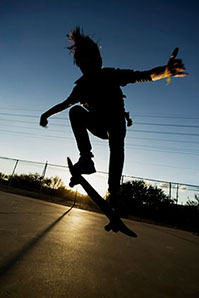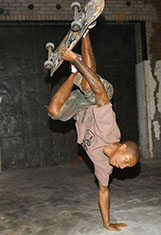SciGen Teacher Dashboard
Unit T3
Claims & Evidence
 Reading: Skaters in the Suburbs and the City
Reading: Skaters in the Suburbs and the City
Duration: Approximately 25 minutes
Unlike claims in ELA class where evidence is generally drawn from a text, scientific evidence must come from the results of an experiment.
The idea of claims and evidence in science is explored in the context of risks associated with skateboarding.
LEARNING OBJECTIVE
This passage gives students another view on the world of skateboarding and brings up different kinds of claims and evidence.
Teacher Tips
- Be ready for discussions of stereotypes and the concept of "selling out."
- See Lupe Fiasco’s video for “Kick, Push” – great scenes of skating in urban environments.
Teaching Notes
ACTIVITY OVERVIEW
- Set the context (10 minutes)
- Engage with poem excerpts (10 minutes)
- Read article (10 minutes)
Set the context (10 minutes)
:
The idea of claims and evidence in science is explored in the context of risks associated with skateboarding. This passage gives students another view on the world of skateboarding and brings up different kinds of claims and evidence.
Prior to distributing or reading the pieces together, use the discussion questions to establish context.
- What is a stereotype? Who is a stereotypical skateboarder according to many people?
- Why do many kids who live in the city and like skateboarding get made fun of by their friends and classmates? Is this an example of stereotyping? If so, how?
- Would you rather give up something you love in order to fit in, or would you rather do what you love even if it meant people thought you were weird or a “sell-out”?
Engage with poem excerpts (10 minutes)
Distribute or project poem excerpt and the quotation and have student read.
 They would push, till they couldn't skate no more
They would push, till they couldn't skate no more
Office building lobbies wasn't safe no more
And it wasn't like they wasn't getting chased no more
Just the freedom was better than breathing they said
And the skate route they used to escape out
When things got crazy they needed to break out
They'd head to any place with stairs
Any good grinds, the world was theirs,
And they four wheels would take them there
Till the cops came and said, "There's no skating here"
And so they kick push, kick push
Kick push, kick push, coast
And away they roll
Just rebels without a cause with no place to go
– excerpt from “Kick, Push” by Lupe Fiasco
“You see a lot of people who want to do it but are afraid to because of their ethnicity.”
– A.J., from “The State of Black Skate”
Engage with poem excerpts (10 minutes)
Skateboarding, originally called “sidewalk surfing,” was invented back in the 1950s by California surfers. They put wheels onto surfboard-shaped planks so they could practice surfing even when there were no good waves. Since that time, most people think of skateboarding as something that kids in the suburbs do, not kids in the city. For example, two recent TV shows, The Life of Ryan and Rob & Big, focus on the lives of wealthy skaters who live in mansions. This is the stereotype that many people think of when they think of skaters.
As a result, kids who live in the city and like to skateboard are often made fun of and rejected by their peers. They often feel pressure to play sports that are more accepted in big cities, like football or basketball. Should kids have to give up something they love to fit in because their friends interpret skateboarding as a sport for kids in the suburbs? Is there even any evidence to support this interpretation, or is this just an unfair stereotype?
Skateboarding is one of the fastest growing sports in the country. Some people claim that skateboarding is growing the fastest among kids living in big cities. They see a pattern of new skate parks being built in big cities like Los Angeles, Kansas City, and New York City over the past few years. Professional skateboarders like Rob Dyrdek and Tony Hawk are raising money to build more than 300 new skate parks in cities around the country. It is plausible that many more kids from the inner city will skate as a result of these new parks being built.
Hip-hop artists like Lupe Fiasco and Pharrell Williams skateboard, write songs about skateboarding, and design shoes and clothing for skateboarders. Many people claim that Lupe and Pharrell have made it cool for kids in the city to get into skateboarding. However, many of these kids say that people give them strange looks or rag on them because they enjoy a sport that only kids in the suburbs are supposed to like. For example, teenager Elijah from Brooklyn, NY, says: “My own flesh and blood called me a sellout because I skateboard.” As a result, kids like Elijah often feel pressure to give up skateboarding.
What do you think? Should teens like Elijah quit skateboarding to be more like their friends? Or should they do what they love even if their friends see it as selling out?
BETA Version - Please send comments and corrections to info@serpinstitute.org